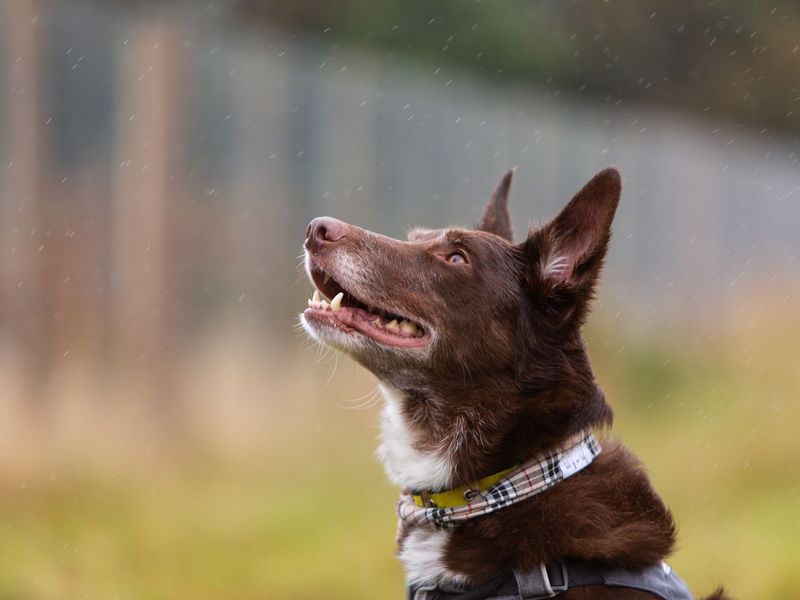How to stop your dog barking
Does your dog bark frequently or for long periods? Find out how to stop them with our top tips.

Barking is a noisy but completely normal part of dog communication.
But if your pooch is barking very frequently or for long periods of time, this isn’t only annoying for you (and your neighbours) – it could also be a sign of deeper issues your dog is experiencing.
It’s important to act early to prevent normal barking, or the reasons for barking, developing into something more serious.
Five top tips to get your dog to stop barking
The key to reducing and even preventing barking is to understand why your dog is barking in the first place. When you learn what your dog hopes to gain from barking, you can show them that they can get what they want by behaving in a calmer, quieter way. You may also be able to make changes to your dog’s living space, so they no longer feel the need to bark.
Don’t tell your dog off
Although their barking may be frustrating, never tell your dog off.
Telling them off could make them anxious or confused about you. This could make things worse; encouraging them to bark even more in worry or confusion.
Some dogs might even see you shouting as …
Avoid things that your dog finds scary
Teach your dog calmer ways of telling you what they want
If your dog is barking for something specific, like to make another dog go away, it’s useful to teach them that doing something quieter and safer will get them the same result.
For example, your dog can’t bark and sniff at the same time. So, diverting their attention …
Make sure your pooch is staying active
Don’t reward your dog for barking
Reward them for staying quiet instead.
If your dog barks at mealtimes, ignore the barking and wait for them to stop before feeding them.
Plan ahead and distract them by giving them a toy when you know you’ll be preparing them a snack.
If your dog barks to …
Further help
When you know what makes your dog bark, avoid this by distracting them with a fun toy or treat before they feel the need.
Prevention is best, as your dog may become confused when you start ignoring their barks. They might bark more and with more intensity to get you to behave as you used to.
If this happens, stay calm and give them lots of praise and attention when they quiet down. They need to learn that quietness brings them the reward they want.
Stay consistent, as giving in and responding to their barking, even if just the once, is likely to teach them to persist and try even harder.
It might also be worth letting your neighbours know that the barking may get worse before it gets better (and maybe drop them a box of chocolates to sweeten the deal), so they’re prepared.
Any problems or changes in your dog’s behaviour are always worth a chat with your vet as there could be medical reasons. If necessary, they will also be able to refer you to a qualified behaviourist who can give you personalised support and guidance.
Contact our Behaviour Support Line
Need help with your dog’s training or behaviour? Contact our Behaviour Support Line for free expert advice.
Call us on 03030036666
or
Our free telephone service is open Monday to Friday 8.:30am to 7.:30pm and Saturday and bank holidays 9.:30am to 5pm.
How to prevent your dog from barking too much
It’s important to make sure your pooch is taught to be confident and calm from when they’re a puppy, even in unusual and unexpected situations.
Your puppy needs to encounter a range of different people, noises and experiences during their ‘socialisation period’ (between about three and 12 weeks of age) so they accept them as a normal and positive part of life.
This includes learning to be calm when alone, getting used to people coming in and out of the house, and being fine with the post person popping to the door.
Experiencing the hustle and bustle of life early on will give them the best chance of coping well in future situations.
This introduction of new experiences needs to be gradual and controlled.
It’s also important that your pup isn’t already anxious or fearful when experiencing new things, as this could make them associate the new thing with these negative feelings.
Why do dogs bark?
To help prevent your dog barking, it's important to know why they are doing it. So, here are three reasons why dogs be vocal.
Barking to get something good to happen
Dogs can learn that barking is a great way of quickly getting our attention. Even us telling them to be quiet may be rewarding because they enjoy being looked at and spoken to.
Other dogs may learn to bark at their mealtimes, usually when their food is being prepared. Because who doesn’t get excited when someone is making them a delicious meal?
If their food is given to them when they’re barking, they’re likely to bark again next time because they have connected barking with their food arriving.
Just as some dogs get excited around food, others can’t get enough of playtime. If barking results in a fun game, they may learn to bark every time they want us to play with them.
Barking when left alone
Dogs that are distressed about being left alone may howl or bark to try to get back to their owners.
Dogs are naturally social animals. But most owners have commitments that mean their dogs might be left at home alone during the day. Some owners also prefer for their dogs to sleep in a separate area of the house.
Unless your dog has been taught that being alone is an okay part of life, this can be scary or frustrating.
If you return home when your dog is barking, your dog might feel that barking was a good thing to do because it worked to bring you home.
Simply ignoring your dog’s barking when left alone, and waiting for them to stop before returning, will not stop them from barking because it doesn’t change the way they feel about being on their own.
Teaching your pooch to relax when left alone is a vital step in stopping them from barking when you’re not around.
Barking to prevent something bad from happening
When your dog is frightened about something and feels under threat, whether the threat is real or not, they might bark at whatever is scaring them to make it go away.
If barking works to get rid of the scary thing, your dog will learn to bark again next time they want to feel safe.
For example, some dogs may be frightened by the postie coming up the path and pushing letters through the door.
If they started barking as the post-person arrived, they might connect their barking with them turning and walking away.
Your dog has no way of understanding that they were going to go leave anyway, so barking seems to do the trick.
Dogs who are worried about something nearby might also bark to ‘tell us’ that this ‘thing’ is present because they need us to take action to help them feel safe. It could be something they’ve seen, heard, felt or smelt, and something that we might not be aware of at all.
Related articles




